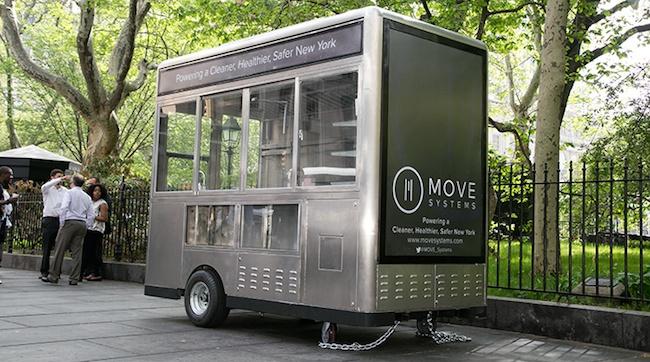
The Intertubes have been buzzing with news of a new pilot project that will provide 500 "state-of-the-art, eco-friendly" food carts to vendors in New York City. That's a hefty chunk out of the estimated 8,000 food carts plying the streets, and the switch is expected to have a big impact on emissions from the tiny mobile kitchens.
City officials and MOVE Systems, which is supplying the carts, estimate that each of its new MRV100 models will cut down on greenhouse gases by 60 percent for each cart, and cut nitrogen oxide emissions by 95 percent.
That all sounds great, but when you get into the nitty gritty the picture gets a little more complicated.
Food carts: The good, the bad and the ugly
To be clear on the terminology, the new food carts are carts, not trucks. Depending on their size and staging location, they don't need to be towed to their selling location. You can simply push them down the street by hand.
Since they don't have diesel engines, that means your typical food cart is already one step ahead of food trucks in terms of greenhouse gas emissions.
With the kind of tweaks engineered by MOVE Systems, food carts can also provide entrepreneurs with a relatively low-cost, eco-friendly startup opportunity.
TriplePundit has recently noted that food carts (and trucks) can provide a mobile, flexible solution to the "food desert" crisis besetting some communities.
The problem is that the typical food cart relies on highly volatile propane fuel, which has been implicated in a series of food cart (and food truck) fires in New York.
In New York City, a lax environment for enforcing food health and safety regulations has also bedeviled the mobile food industry.
An eco-friendly food cart solution
MOVE Systems has taken on both sides of the problem.
On the fuel side, the MRV11 uses no propane. The resulting cut in emissions is expected to be the equivalent of removing almost 200 cars from the road per cart, based on calculations provided by the organization Energy Vision.
On the food safety side, the MRV11 packs a full kitchen designed for sanitary operation into a small space.
Here's the rundown from the eco-friendly food cart announcement:
"The MRV100 vending vehicle included a restaurant-grade kitchen with refrigeration and a sustainable energy system that utilizes solar power, alternative fuel, and plug-in hybrid technology. Each cart will be modeled after a stationary kitchen and will be equipped with refrigeration and sink for proper food preparation."
MOVE systems has also leveraged the aforementioned entrepreneur-friendly nature of food carts by partnering with the company First Data to provide MRV100 vendors with its Clover point-of-sale mobile technology.
The whole package is designed to practically sell itself, but the vendors who get the first 500 won't have to fork over the dough. A basic food cart ranges in price from $15,000 to $25,000, and MOVE is giving its carts away to the first 500 vendors who apply.
We're guessing that business model is designed to get the new carts out onto the streets as quickly as possible, where they can start drawing customers away from other carts, providing more vendors with an incentive to make the switch.
... Or maybe not, as the case may be
The MRV100 certainly makes a great case for eco-friendly food carts as far as curbside emissions go, but buried farther down in the press materials is some more information on the alternative fuel that is replacing propane.
That turns out to be compressed natural gas (CNG) provided by the company Clean Energy Fuels.
The bulk of Clean Energy Fuels' business is in fossil natural gas, which brings up a host of undesirable sourcing issues related to the natural gas drilling method known as fracking.
We're going to hold off on tooting the eco-friendly horn for now, but keep in mind that Clean Energy is also marketing a renewable biomethane, so some day in the sparkling green future those eco-friendly food carts could be serving up fine food without the need for either propane or fossil natural gas.
Image credit: MOVE Systems.

Tina writes frequently for TriplePundit and other websites, with a focus on military, government and corporate sustainability, clean tech research and emerging energy technologies. She is a former Deputy Director of Public Affairs of the New York City Department of Environmental Protection, and author of books and articles on recycling and other conservation themes.














